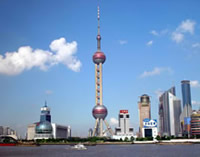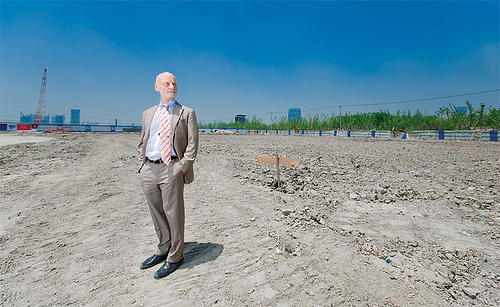|
|


ADVERTISEMENT
Buy Your own advertising
spaces!
.
Download Adobe Acrobat Reader to open [PDF] files.
Recent Visitors
Uli Sigg: Ecosystem clock is ticking
2010. 17 March
 Uli Sigg, born in 1949, is former Swiss Ambassador to China and one of the world’s most influential collectors of Chinese contemporary art. He is the Commissioner-General of the Swiss pavilion in the 2010 Shanghai Expo.
Uli Sigg, born in 1949, is former Swiss Ambassador to China and one of the world’s most influential collectors of Chinese contemporary art. He is the Commissioner-General of the Swiss pavilion in the 2010 Shanghai Expo.
(english.eastday.com) It is a great honor for me to be invited by the Swiss government to
personally participate in the pageant of World Expo 2010 Shanghai China as the
Commissioner-General for the Swiss Pavilion, which is a very important
assignment. As a foreigner who came to China at the very beginning of its
reforms and opening-up and who has always studied the country with persistent
attention and love, I sincerely hope that I can use my experience and knowledge
to help Switzerland improve its understanding about China. Meanwhile, I will
also help China better understand Switzerland to promote close cooperation
between the two
nations. Chinese Version>>
I have been an old friend of China. I made my first visit to this country at the very start of its reforms and opening-up in 1978, when I was appointed by a Swiss company to prepare for the incorporation of a joint venture. At that time, I was full of curiosity about this strange country. I still remember clearly how Chinese women used to wear the same unvarying hairstyle and gloomy-colored suits and how people stuck to their traditional ideology. After that, I revisited this country several times and once resided there as the Swiss Ambassador to China. In the early 1990s, I started collecting modern Chinese artwork and communicating with Chinese artists, through whose eyes and experiences I have understood this country’s history and culture and the lives of its people. It has been an honor for me to witness the fundamental changes in China and to personally participate in its reforms and opening-up policies. In a mere three decades, China has taken on a brand new look in every aspect and exhibited to the whole world its great vigor and dazzling glamour.
Meanwhile, however, I have also seen how China’s rapid economic growth has created some problems, such as environmental damage and a gap between urban and rural development. I believe an understanding and concern about these problems helped motivate this World Expo to choose the theme“Better City, Better Life”. Reaching beyond the scope of its predecessors, which centered their exhibitions on scientific and technological inventions, progress and achievements, this World Expo has innovatively provided the whole world with a platform for joint discussion about urban development issues. It fully exhibits China’s courage and resolution in facing up to problems in its own development and brims with foresight and intelligence.
Since urban problems arising from rapid economic growth have become a hot and thorny issue for the whole world, many nations have been trying to find a“key”for addressing these problems. Switzerland once faced many problems similar to those China is facing today. At the first glance, Switzerland and China seem dissimilar. Switzerland is a small territory with a population of only 7.4 million. It is not as vast or populated as China and suffers a per-capita shortage of resources. However, the two nations are actually facing some similar development problems such as density of population and large tracts of inhospitable land. One-third of Switzerland’s territory consists of rocks, forests and lakes. Over a long time, Switzerland has been looking for an approach to sustainable development to achieve harmony between urban and rural areas, between human beings and nature.
Another example is water pollution. Fifty years ago when I was a little boy, I lived by a river in a Swiss village. In that age of rapid industrial and agricultural growth, all wastes were dumped into rivers, turning them into turbid filth. The Swiss born nowadays can hardly imagine how the rivers looked at that time. Later, the Swiss government made up its mind to enforce waste treatment. It enacted strict regulations prohibiting direct discharge of wastes into rivers and spent multi-billion francs to clean up dirty rivers. It took about 30 years for the rivers to regain their health. Today, every Swiss may proudly describe how clear the rivers are and may even drink water scooped from a river to prove that it completely meets standards for drinking.
I am full of confidence for China’s ability to handle its environmental problems of water and air pollution. I must point out, however, that time waits for no one, so we must take action immediately. This will be a long, complicated process that cannot be completed overnight. Since China will surely spend a longer time than Switzerland has, it must well prepare itself for this mission that requires the unremitting efforts of several generations.
At this World Expo, the Swiss Pavilion themed“Rural-Urban Interaction”will serve as a carrier for our anticipated dialogues with China and the world. The most wonderful part of the pavilion is the cable cars that run every seven minutes. Escaping from urban noises and boarding a cable car, visitors will be brought to the top of the pavilion to be greeted by a pastoral scene with groves, meadows and the sounds from the natural environment of Switzerland that will give them a feeling of tranquility and peace. In the pavilion, we will also use pictures and various multimedia technologies to showcase Switzerland’s latest achievements and up-to-date concepts related to treatment of air and water pollution, and our great efforts in development of public transport and buildings for sustainable development. Switzerland boasts, in particular, a cutting edge in the science, technology and know-how of green architecture. I believe some of its good examples may be borrowed by China.
Shanghai is a great city brimming with vigour and vitality and witnessing new changes all the time. During each of my visits to Shanghai, I found many new discoveries that would both shock me and send me into contemplation. In 2008, Beijing amazed the world with its successful Olympic Games. I believe Shanghai will carry the success to a higher level in 2010 by presenting the world with a wonderful World Expo. Today, our Swiss Pavilion is steadily progressing as scheduled and the pace of the progress will definitely be accurate to within a second, just like a watch made in Switzerland. I also hope that Shanghai would pay particular attention to security measures and formulate proper visa-granting procedures for foreign visitors. Security is a very important issue that will involve the lives of everyone.
I sincerely hope this World Expo will, as expected, facilitate the achievement of better cities and a happier life for people. More importantly, I would like to stress that this goal will be achieved only when every one of us makes some practical contribution to it in our daily life.
Source: english.eastday.com


